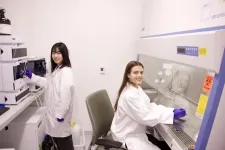(Press-News.org) Patients will be better able to benefit from innovations in medical artificial intelligence (AI) if a new set of internationally-agreed recommendations are followed.
A new set of recommendations published in The Lancet Digital Health and NEJM AI aims to help improve the way datasets are used to build Artificial intelligence (AI) health technologies and reduce the risk of potential AI bias.
Innovative medical AI technologies may improve diagnosis and treatment for patients, however some studies have shown that medical AI can be biased, meaning that it works well for some people and not for others. This means some individuals and communities may be ‘left behind’, or may even be harmed when these technologies are used.
An international initiative called ‘STANDING Together (STANdards for data Diversity, INclusivity and Generalisability)’ has published recommendations as part of a research study involving more than 350 experts from 58 countries. These recommendations aim to ensure that medical AI can be safe and effective for everyone. They cover many factors which can contribute to AI bias, including:
Encouraging medical AI to be developed using appropriate healthcare datasets that properly represent everyone in society, including minoritised and underserved groups;
Helping anyone who publishes healthcare datasets to identify any biases or limitations in the data;
Enabling those developing medical AI technologies to assess whether a dataset is suitable for their purposes;.
Defining how AI technologies should be tested to identify if they are biased, and so work less well in certain people.
Dr Xiao Liu, Associate Professor of AI and Digital Health Technologies at the University of Birmingham and Chief Investigator of the study said:
“Data is like a mirror, providing a reflection of reality. And when distorted, data can magnify societal biases. But trying to fix the data to fix the problem is like wiping the mirror to remove a stain on your shirt.
“To create lasting change in health equity, we must focus on fixing the source, not just the reflection.”
The STANDING Together recommendations aim to ensure that the datasets used to train and test medical AI systems represent the full diversity of the people that the technology will be used for. This is because AI systems often work less well for people who aren’t properly represented in datasets. People who are in minority groups are particularly likely to be under-represented in datasets, so may be disproportionately affected by AI bias. Guidance is also given on how to identify those who may be harmed when medical AI systems are used, allowing this risk to be reduced.
STANDING Together is led by researchers at University Hospitals Birmingham NHS Foundation Trust, and the University of Birmingham, UK. The research has been conducted with collaborators from over 30 institutions worldwide, including universities, regulators (UK, US, Canada and Australia), patient groups and charities, and small and large health technology companies. The work has been funded by The Health Foundation and the NHS AI Lab, and supported by the National Institute for Health and Care Research (NIHR), the research partner of the NHS, public health and social care.
In addition to the recommendations themselves, a commentary published in Nature Medicine written by the STANDING Together patient representatives highlights the importance of public participation in shaping medical AI research.
Sir Jeremy Farrar, Chief Scientist of the World Health Organisation said:
“Ensuring we have diverse, accessible and representative datasets to support the responsible development and testing of AI is a global priority. The STANDING Together recommendations are a major step forward in ensuring equity for AI in health.”
Dominic Cushnan, Deputy Director for AI at NHS England said:
“It is crucial that we have transparent and representative datasets to support the responsible and fair development and use of AI. The STANDING Together recommendations are highly timely as we leverage the exciting potential of AI tools and NHS AI Lab fully supports the adoption of their practice to mitigate AI bias.’’
The recommendations have been published today (18th December 2024), and are available open access via The Lancet Digital Health.
These recommendations may be particularly helpful for regulatory agencies, health and care policy organisations, funding bodies, ethical review committees, universities, and government departments.
END
New recommendations to increase transparency and tackle potential bias in medical AI technologies
2024-12-18
ELSE PRESS RELEASES FROM THIS DATE:
Davos Alzheimer’s Collaborative and pharmaceutical and diagnostics companies work together on Alzheimer’s disease blood biomarker validation
2024-12-18
The Davos Alzheimer’s Collaborative (DAC), a pioneering worldwide initiative seeking to cure Alzheimer’s disease and improve brain health, today announced they will work with Janssen Research & Development, LLC, a Johnson & Johnson company, and Beckman Coulter Diagnostics, two leading pharmaceutical and diagnostics companies, to advance the assay validation of blood-based biomarkers (BBMs) for Alzheimer’s disease for global use in diverse populations.
DAC, via its Global Cohorts Program, has enabled ...
Bio-electrochemical cell producing hydrogen from microorganisms in waste: Pathway to large-scale implementation unveiled
2024-12-18
Dr. Jwa Eunjin and her research team at the Korea Institute of Energy Research (KIER) have achieved a significant breakthrough in clean energy technology. The team has successfully enhanced a crucial component of a bio-electrochemical cell, enabling more efficient hydrogen production from microorganisms found in waste. This advancement resolves longstanding power loss challenges in conventional processes, offering a transformative pathway toward large-scale, cost-effective hydrogen production.
Biogas, a renewable ...
People from some racial and ethnic groups may face barriers to obtaining obesity medications
2024-12-18
Asians, non-Hispanic Blacks and Hispanics were significantly less likely than whites to use obesity-management medications to lower their weight compared with whites, new research suggests. The differences could not be fully explained by income or education level, health insurance coverage or clinical need.
The study, published in the peer-reviewed Journal of Racial and Ethnic Health Disparities, is one of the few to compare the use of obesity-management medications across racial and ethnic groups, and the first to consider ...
Microplastics in the air may be leading to lung and colon cancers
2024-12-18
A review of 3,000 studies also suggests these minute plastic air particles may be causing male and female infertility.
Tires and degrading garbage shed tiny pieces of plastic into the air, creating a form of air pollution that UC San Francisco researchers suspect may be causing respiratory and other illnesses.
A review of some 3,000 studies implicates these particles in a variety of serious health problems. These include male and female infertility, colon cancer and poor lung function. The particles also may contribute to chronic pulmonary inflammation, ...
Elevated levels of ‘forever chemicals’ found in several smartwatch wrist bands
2024-12-18
Smartwatches and fitness trackers have become ubiquitous forms of wearable tech, accompanying many people throughout their days (and nights). But they may expose the skin to so-called forever chemicals in the process. More expensive wristbands made from fluorinated synthetic rubber revealed particularly high amounts of one forever chemical, perfluorohexanoic acid (PFHxA), according to a study published in ACS’ Environmental Science & Technology Letters.
“This discovery stands out because of the very high concentrations of one type of forever chemical found in items that are in prolonged contact with ...
Potentially harmful bacteria slip through antimicrobial showerheads
2024-12-18
To guard against harmful waterborne pathogens, many consumers, including managers of health-care facilities, install antimicrobial silver-containing showerheads. But in ACS ES&T Water, researchers now report that these fixtures are no “silver bullet.” In real-world showering conditions, most microbes aren’t exposed to the silver long enough to be killed. However, the composition of rare microbes in water from these showerheads varied with each type of fixture tested.
The stream of droplets and fine mist that form during a shower could be inhaled or swallowed. Installing showerheads ...
Children’s Hospital Colorado research transforms the standard of care for childhood cancer
2024-12-18
After participating in a global clinical trial, leaders at the Children’s Hospital Colorado (Children’s Colorado) Center for Cancer and Blood Disorders and the University of Colorado Cancer Center are celebrating results so transformative, they change the standard of care for treating most kids with B-cell acute lymphoblastic leukemia (B-ALL), the most common form of childhood cancer. The new therapy is less toxic than traditional chemotherapy, resulting in significantly fewer side effects like severe infections, mouth sores and bone marrow suppression, ...
Nature’s instructions: How fungi make a key medicinal molecule
2024-12-18
For roughly a century, ever since Alexander Fleming’s accidental discovery of penicillin in 1928, fungi have proven to be a goldmine for medicines. They’ve provided treatments for a wide range of diseases, from infections and high cholesterol to organ rejection and even cancer.
However, the process by which fungi synthesize some of their most potent compounds remains opaque. This is especially true of cyclopentachromone, a key building block in fungal products whose derivatives have shown promise in fighting cancer and reducing inflammation, among other medicinal properties.
Reading Nature’s Instructions
While chemists have made progress in creating ...
Michael Courtney of Turku Bioscience Center receives grant for research on SYNGAP1 missense variants and drug repurposing from SynGAP Research Fund (SRF) dba Cure SYNGAP1
2024-12-18
Mill Valley, CA – December 18, 2024 – The SynGAP Research Fund 501(c)(3) dba Cure SYNGAP1 announced a $108,867 grant to Dr. Michael Courtney and Dr. Li-Li Li at the Turku Bioscience Centre, University of Turku, Finland, to advance their research on SYNGAP1 missense variants. Their project seeks to better understand the functional impact of these mutations and explore drug repurposing as a potential therapeutic approach.
Dr. Courtney’s team will use advanced phenotyping techniques to assess how SYNGAP1 missense variants impact the protein’s ...
Sexism is a risk factor for memory decline among women
2024-12-18
NEW YORK, NY (Dec. 18, 2024)--Women born in the most sexist U.S. states experience faster memory decline in later years compared to women born in the least sexist states, a new study by researchers at Columbia University Vagelos College of Physicians and Surgeons has found.
The difference between being born in the most versus the least sexist state was equivalent to nine years of cognitive aging.
The study is one of a growing number of studies that have investigated links between structural sexism and health. Structural sexism, like structural racism, does not refer to personal incidences but to inequality in resources and power ...



